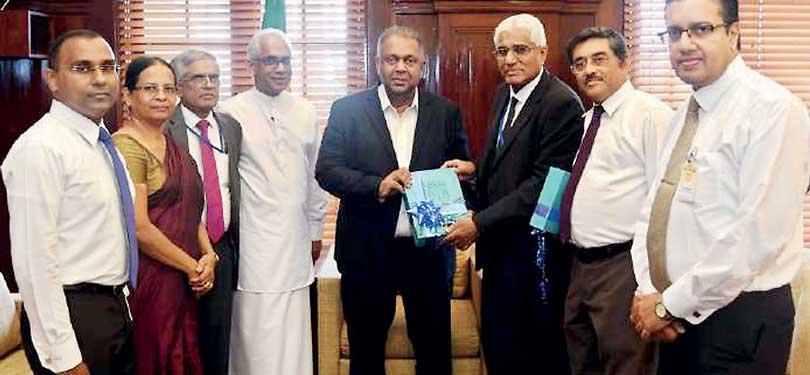26 Apr 2019 - {{hitsCtrl.values.hits}}

Central Bank Governor Dr.Indrajit Coomaraswamy presenting the Annual Report 2018 to Finance Minister Mangala Samaraweera. State Finance Minister Eran Wickramaratne, Finance Ministry Secretary and ex-officio member of the Monetary Board Dr. R.H.S. Samaratunga, Senior Deputy Governor Dr.Nandalal Weerasinghe, Assistant Governor Swarna Gunaratne, Economic Research Department Acting Research Director Dr. Chandranath Amarasekara and Economic Research Department Additional Director Dr.P.K.G.Harischandra are also in the picture
The Central Bank (CB) has urged the government to expedite the reform agenda to avoid the middle-income trap amid stagnating economic growth, which has led to a marginal decline in per capita income to US $ 4, 102 in 2018 from US $ 4, 104 recorded in 2017.
According to the Central Bank Annual Report 2018, Sri Lanka’s economy grew by 3.2 percent compared to 3.4 percent in 2017. The Central Bank expects the economic growth to pick up to 4 percent this year.
Sri Lanka’s dependency on external resources rose in 2018 as the savings-investment gap widened while investment as a percentage of GDP also declined to 28.6 percent in 2018 compared to 28.8 percent in the previous year.
The Central Bank expects the per capita GDP to further decline to US $ 4, 101 this year.
Despite Sri Lanka’s graduation to the middle income status in 2010 after reaching US $ 4, 000 per capita income, the Central Bank pointed out that the country’s economy has been performing below its potential due to delays in implementing far reaching policy reforms.
“Delays in addressing barriers to growth and introducing growth enhancing reforms in the areas of export promotion, attracting FDI, reducing budget deficits and debt levels, reforming factor markets, strengthening public administration, and ensuring the rule of law have largely contributed to Sri Lanka’s economic stagnation, while peer economies have progressed rapidly as a result of growth supporting reforms.”
The Central Bank stressed on expediting the required structural reforms with a focus on improving productivity and efficiency of the economy in order for Sri Lanka to succeed as a higher income economy and improve the wellbeing of its people.
Though reforms such as National Export Strategy (NES) and New Trade Policy (NTP) are already in place, the Central Bank noted that implementation has been slow.
“The country can no longer afford to postpone such reforms, if Sri Lanka is to progress along a high and sustainable growth trajectory over the medium term and catch up with countries that were behind Sri Lanka several decades ago.”
15 Nov 2024 53 minute ago
15 Nov 2024 1 hours ago
15 Nov 2024 1 hours ago
15 Nov 2024 1 hours ago
15 Nov 2024 1 hours ago